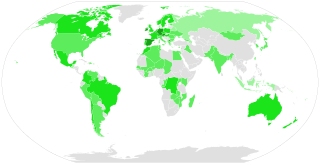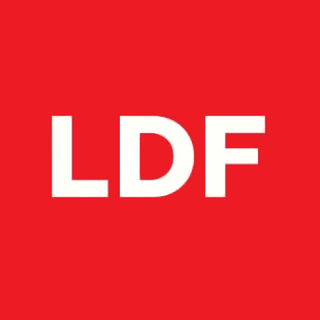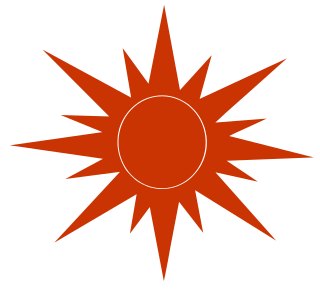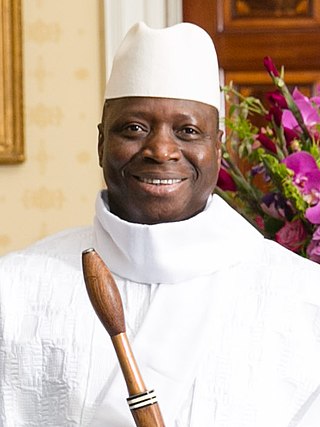
A green party is a formally organized political party based on the principles of green politics, such as social justice, environmentalism and nonviolence.

The Gambia, officially the Republic of The Gambia, is a country in West Africa. It is the smallest country within mainland Africa and is surrounded by Senegal, except for its western coast on the Atlantic Ocean. The Gambia is situated on both sides of the lower reaches of the Gambia River, the nation's namesake, which flows through the centre of The Gambia and empties into the Atlantic Ocean, and elucidates the long shape of the country. It has an area of 11,300 square kilometres (4,400 sq mi) with a population of 1,857,181 as of the April 2013 census. Banjul is the Gambian capital and the country's largest metropolitan area, while the largest cities are Serekunda and Brikama.

The Green Left is a democratic socialist political party in Denmark. It was formerly known in English as the Socialist People's Party, the literal translation of its Danish name.

The Jammu & Kashmir National Conference (JKNC) is a regional political party in the Indian union territories of Jammu and Kashmir and Ladakh. Founded as the All Jammu and Kashmir Muslim Conference by Sheikh Abdullah and Chaudhry Ghulam Abbas in 1932 in the princely state of Jammu and Kashmir, the organisation renamed itself to "National Conference" in 1939 in order to represent all the people of the state. It supported the accession of the princely state to India in 1947. Prior to that, in 1941, a group led by Ghulam Abbas broke off from the National Conference and revived the old Muslim Conference. The revived Muslim Conference supported the accession of the princely state to Pakistan and led the movement for Azad Kashmir.
A dominant-party system, or one-party dominant system, is a political occurrence in which a single political party continuously dominates election results over running opposition groups or parties. Any ruling party staying in power for more than one consecutive term may be considered a dominant party. Some dominant parties were called the natural governing party, given their length of time in power.

The Left Democratic Front (LDF) also known as Left Front (Kerala) is an alliance of left-wing political parties in the state of Kerala, India. It is the current ruling political alliance of Kerala, since 2016. It is one of the two major political alliances in Kerala, the other being Indian National Congress-led United Democratic Front, each of which has been in power alternately for the last four decades. LDF has won the elections to the State Legislature of Kerala in the years 1980, 1987, 1996, 2006, 2016 and had a historic re-election in 2021 where an incumbent government was re-elected for first time in 40 years. LDF has won 6 out of 10 elections since the formation of the alliance in 1980. The alliance consists of CPI(M), CPI and various smaller parties.

The People's Party is a Panamanian Christian democratic political party. Beginning in 1956, as Social Democratic Action, it was made up of middle-class professionals, intellectuals and students, with support from trade unions, particularly the Federation of Christian Workers. It went on to become one of Latin America's most conservative and anti-communist Christian democratic parties. The ideological foundation of the party is based on the social doctrine of the Catholic Church. The PP is a full member of the Christian Democrat International and Christian Democratic Organization of America.

The United National Independence Party (UNIP) is a political party in Zambia. It governed the country from 1964 to 1991 under the socialist presidency of Kenneth Kaunda, and was the sole legal party in the country between 1973 and 1990. On 4 April 2021, Bishop Trevor Mwamba was elected President of UNIP.

The People's Democratic Organisation for Independence and Socialism (PDOIS) is a socialist political party in the Gambia. Since 2005, it has been part of the National Alliance for Democracy and Development (NADD). It was part of Coalition 2016 in the 2016 presidential election, whose candidate, Adama Barrow, defeated long-time incumbent Yahya Jammeh. The PDOIS also publishes a party newspaper, Foroyaa, which was noted for its opposition to the Jammeh regime.

The People's Progressive Party is a political party in the Gambia. It was the dominant ruling party of the House of Representatives and the presidency from 1962 to 1994. The president throughout this time period was Dawda Jawara. The People's Progressive Party lost power after the 1994 Gambian coup d'état, a military coup led by young, junior military officers. The Alliance for Patriotic Reorientation and Construction (APRC) then became the dominant party of the Gambia. The People's Progressive Party remains active, but lacking the same level of support it garnered in the 20th century.

The People's National Congress Reform (PNCR) is a social-democratic and democratic socialist political party in Guyana led by Aubrey Norton. The party currently holds 31 of the 65 seats in the National Assembly. In Guyana's ethnically divided political landscape, the PNCR is a multi-ethnic organization.

The Islami Jamhoori Ittehad was a right-wing conservative alliance formed in September 1988 to oppose the democratic socialist Pakistan Peoples Party in elections that year. The alliance comprised nine parties, of which the major components were the Pakistan Muslim League (PML), National Peoples Party (NPP), Jamaat-e-Islami (JI), with PML accounting for 80% of the IJI's electoral candidates. The Inter-Services Intelligence (ISI) agency, under director Hamid Gul, had a major role in forming the right-of-centre political alliance. Care had been taken to ensure that the alliance comprised nine parties to generate comparison with the nine-party Pakistan National Alliance (PNA) that had campaigned against PPP in 1977.

Kerala is an Indian state, where federal legislative power is vested in the unicameral Kerala Legislative Assembly. The multilateral system has, since 1956, been dominated by the several pre-poll and post-poll alliances.
The Muslim Congress Party was a political party in the Gambia. The party was founded during the pre-independence period to represent the Muslim population in the colony of Bathurst. The party was led by I.M. Garba-Jahumpa. The party emerged from the Bathurst Young Muslim Society.
The Democratic Party was a political party in the Gambia. The party was founded during the pre-independence period in the colony of Bathurst. Ahead of the 1962 general elections, the DP merged with the Muslim Congress Party to form the Democratic Congress Alliance. In 1960, Alieu Ebrima Cham Joof who has been one of the original members was elected at its Social Secretary.

Provincial elections were held in British India in the winter of 1936-37 as mandated by the Government of India Act 1935. Elections were held in eleven provinces - Madras, Central Provinces, Bihar, Orissa, the United Provinces, the Bombay Presidency, Assam, the North-West Frontier Province, Bengal, Punjab and Sind.

Parliamentary elections were held in the Gambia on 29 March 2012. The ruling Alliance for Patriotic Reorientation and Construction (APRC) won 43 of the 48 elected seats.

Provincial elections were held in British India in January 1946 to elect members of the legislative councils of the Indian provinces. The consummation of British rule in India were the 1945/1946 elections. As minor political parties were eliminated, the political scene became restricted to the Indian National Congress and the Muslim League who were more antagonised than ever. The Congress, in a repeat of the 1937 elections, won 90 percent of the general non-Muslim seats while the Muslim League won the majority of Muslim seats (87%) in the provinces. Nevertheless, the All India Muslim League verified its claim to be the sole representative of Muslim India. The election laid the path to Pakistan.
Alieu Badara Njie was a Gambian statesman who served as the 3rd Vice-President of the Gambia from 1977 to 1981. He served as the first Gambian Ambassador to Senegal and in Dawda Jawara's first cabinet. He held several ministerial roles under Jawara and played a key role in securing Gambian independence. He was Minister of Foreign Affairs from 1965–1967 and 1974–77, Minister of Communications from 1960–1961 and 1963–1965, Minister of Works from 1962–1965, Minister of Information from 1970–1971, and Minister of Agriculture from 1972–1974.
Ibrahima Muhammadu/Momodou Garba-Jahumpa (1912–1994), was a Gambian trade union leader and politician who served as the Minister for Agriculture, Minister for Health and Minister for Finance.















